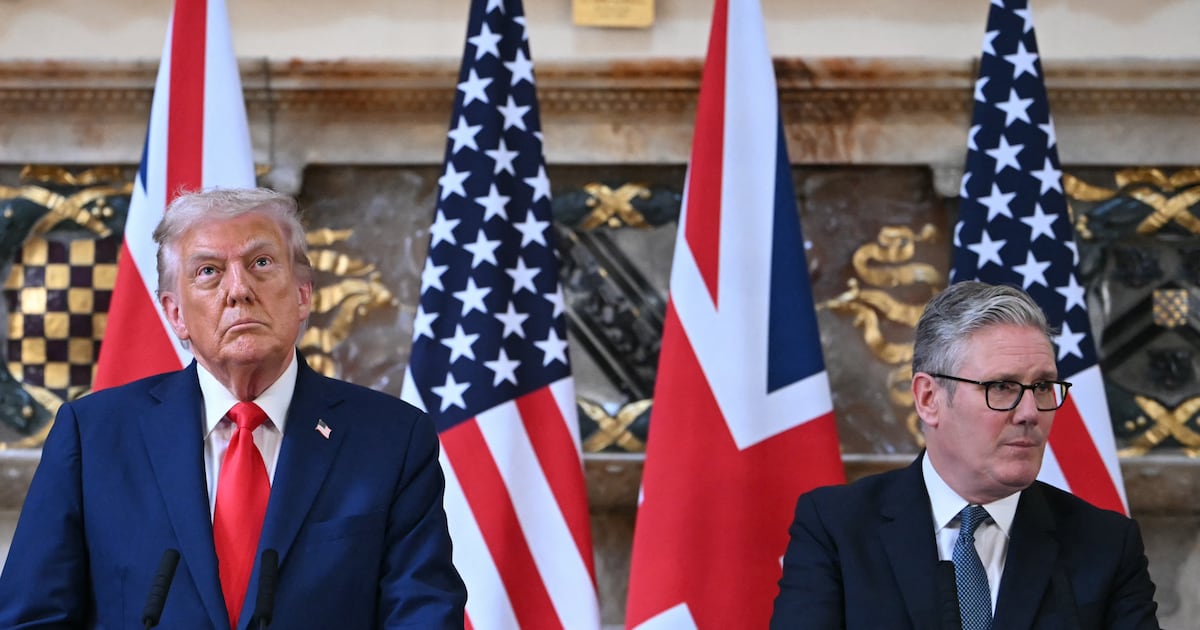US president Donald Trump and British prime minister Keir Starmer hailed the renewal of their nations’ “special relationship” on Thursday, ending the US leader’s unprecedented second state visit with a show of unity after avoiding several possible pitfalls.
At a warm press conference when the two leaders glossed over differences on Gaza and wind power to present a united front, Mr Trump reserved his toughest language for Russian president Vladimir Putin who he said had “let him down” in his efforts to end what he thought would be an easy war to resolve in Ukraine.
After two days of his state visit to Britain, which the US leader described as an “exquisite honour”, Mr Trump was in a relaxed mode at the final press conference when Mr Starmer was focused on skirting over potential areas of disagreement.
The press conference ended without either being tripped up by potential embarrassing subjects, with both batting away questions over the late sex offender Jeffrey Epstein and his ties to Mr Trump and to Mr Starmer’s former ambassador to the US.
“We’ve renewed the special relationship for a new era,” Mr Starmer told reporters.
“This partnership today is a signal of our determination to win this race together and to ensure it brings real benefits in jobs, in growth, in lower bills, to put more hard-earned cash in people’s pockets at the end of each month.”
Mr Trump also described the close ties enjoyed by the two countries, praising Mr Starmer for being a tough negotiator in securing the first tariff deal with the US.
“We’re forever joined, and we are forever friends and we will always be friends,” Mr Trump said.
Earlier, some of the leading names in US and UK business were welcomed by the two leaders to unveil a record £150 billion package of US investment into Britain, part of a wider £250 billion pound package officials say will benefit both sides.
Mr Starmer said the deals would “light up the special relationship for years to come”. Mr Trump was equally effusive. “The ties between our countries are priceless.
“We’ve done some things that financially are great for both countries … I think it’s an unbreakable bond we have, regardless of what we’re doing today. I think it’s unbreakable.”
Mr Starmer has pitched Britain as a destination for US investment, aligned to its financial services, tech and energy sectors so it can draw in US capital and build out its infrastructure to grow the economy.
He was keen to champion deals including a new technology agreement with companies from Microsoft to Nvidia and OpenAI.
In terms of any differences, it was on foreign affairs where the two were most out of lockstep.
Mr Starmer, and other European leaders, have been pressing Mr Trump to put more pressure on Mr Putin to end his war against Ukraine; Mr Trump, while criticising the Russian president, failed to mention any further sanctions against Moscow.
The US leader again expressed frustration that European nations were still buying Russian oil, but said Mr Starmer was not part of their number.
Mr Trump also repeated his position that he disagreed with countries recognising Palestine – something Starmer has said Britain will do if Israel fails to relieve suffering in Gaza and reach a ceasefire in its nearly two-year war with Hamas.
“I have a disagreement with the prime minister on that score, one of our few disagreements, actually,” Mr Trump said.
But the two leaders sidestepped questions on Epstein, after both were asked about Mr Starmer’s decisions to sack Peter Mandelson as ambassador to the US last week after his close ties with the late financier were released. Mr Trump’s relationship with Epstein has also come under scrutiny.
“I don’t know him actually,” Mr Trump said in response to a question about Mr Mandelson. “I think the prime minister would be better speaking over that, it was a choice that he made.”
Mr Starmer repeated his position: “Some information came to light last week which wasn’t available when he was appointed and I made a decision about it, and that’s very clear.”
The UK leader also avoided a blow-up on differing UK and US interpretations of free speech, after Mr Trump said Britain had “laid the foundations of law, liberty, free speech and individual rights” under its empire and “must continue to stand for the values … of the English-speaking world”.
When the final question was answered, a clearly relieved Mr Starmer ushered Mr Trump out of the Great Hall at Chequers before the president leaves to return to Washington. – Reuters

